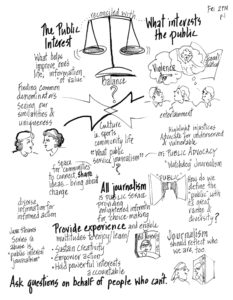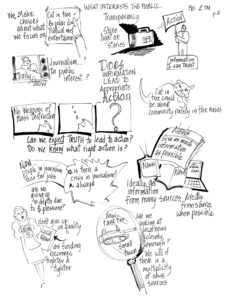Convener: Melinda Wittstock/Jan Schaffer
Participants: Linda, Jonathan, Matt, ?, Lisa, Sarah, Stacy, Silja, Karen, Diane, Ken, Cindy, Ralph, Sarah, Florangela, ?
Reporter: Florangela
Discussion 
“The highest traffic websites are porn sites.
“Look at the appeal of sports.
“Prurient news vs. what is valuable
“I’d argue sports is just as important. It’s part of our culture. It’s what makes us a community.
“When we get into trouble is when valuable information gets left out and it’s just entertainment.
Question: What is public service journalism???
- Journalism that helps us see ourselves as human; to see our uniqueness and our similarities with one another. We need to know we’re not alone. Journalism that helps stitch the culture together. Sometimes we’re just holding a mirror to ourselves.
- It’s creating a space for communities to work. It’s giving them information, giving them a way to exchange ideas. It also serves as a watchdog, cultivating fairness and justice.
- Our job is to provide information for residents. To allow as many people as possible to participate in civil society.
- Providing a diverse amount of information for informed action
- It highlights injustices.
- The term “public” is way too broad.
- We can’t commit journalism from on high.
- All journalism is public service. Providing information that helps us to make decisions. It’s broad, deep, has depth.
- Provides a window into civic life. IE giving access to public events.
- It supports and sustains creativity and culture in communities in which it operates. It empowers audiences and it does hold powerful interests accountable.
- Look at the work done by Jane Elle Stevens (at the San Jose Mercury News). Look at how the paper reported on individual instances of domestic violence. And then it pulled back, looking at the overall problem. It wasn’t just routine crime reporting. It became a public service
- We are charged with asking questions on behalf of people who can’t, who don’t have that access
- Transparency. Shining light into dark corners.
Question: Does public service/public interest journalism have to be cod liver? (dry, boring).
There’s an assumption that if we give people the information that they’ll do the right thing. But I’m not sure that’s always the case. (WMD, Iraq war)
People hear what they want to hear and they see what they want to see.
Do we do things for the outcome?
The best way to approach truth is to have as much information as possible.
There needs to be a forum where all ideas can be debated and really, that is way more important than a specific outcome.
I would hate to lose an institution that gives out good information.
Watch a speech on TV and then read all the news sources and compare how they interpreted it.
Individuals now have a multitude of sources. We should remember that access to C-Span, etc came about because of public policy decisions.
You can do a story that’s well, that’s captivating, interesting and relative.
Is there a crisis in Journalism? I’d say yes. And No. Some of these same questions were being asked in the ‘70s.
It’s the profession: we’re always critical, we always have two halves to every story. But I’d argue that morale is worse today. People are worried about their livelihood.
Question: Why is news focused on process of politics instead of the issues.
How do you create a demand for that stuff?
A key is to reverse the drive towards ownership consolidation. (And look at how the media wasn’t even covering that subject). Bigger corporations have increased economic pressures and are more distant from the communities they cover.
Is public interest journalism ratings-adverse?
You gotta have the bottom line because otherwise you won’t have the newspaper/station, etc.
I’ve never had someone dictate what I could/could not cover.
Financial pressures retard good journalism.
There’s no One public.
Beat reporters are very process driven but our whole structure of journalism is to document incrementally.
Journalism needs to be much quicker to connect the dots, to give context of a story.
Be aware of where the public interest is and contextualize it.
But ability to think in a larger way (different entry points, different way to cover a story, an issue, etc), is constrained by production deadlines.
